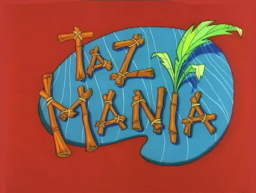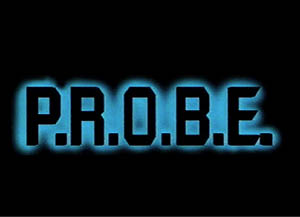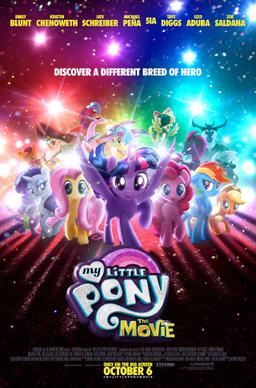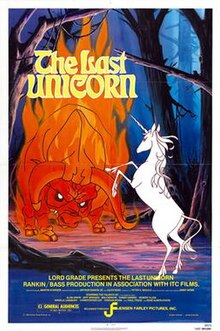In Greek mythology, Celaeno referred to several different figures.

The Hobbit is a 1977 American animated musical television special created by Rankin/Bass and animated by Topcraft. The film is an adaptation of the 1937 book of the same name by J. R. R. Tolkien; it was first broadcast on NBC in the United States on Sunday, November 27, 1977. The teleplay won a Peabody Award; the film received a Christopher Award.

Rankin/Bass Animated Entertainment was an American production company located in New York City, and known for its seasonal television specials, usually done in stop motion animation. Rankin/Bass's stop-motion productions are recognizable by their visual style of doll-like characters with spheroid body parts and ubiquitous powdery snow using an animation technique called Animagic.

Peter Soyer Beagle is an American novelist and screenwriter, especially of fantasy fiction. His best-known work is The Last Unicorn (1968) which Locus subscribers voted the number five "All-Time Best Fantasy Novel" in 1987. During the last twenty-five years he has won several literary awards, including a World Fantasy Award for Life Achievement in 2011. He was named Damon Knight Memorial Grand Master by SFWA in 2018.

Taz-Mania is an American animated sitcom produced by Warner Bros. Animation from 1991 to 1995, broadcast in the United States on Fox Kids where it stars the Tasmanian Devil.

Tammy Lee Grimes was an American film and stage actress.

Adventures of the Little Koala is an anime television series produced by Hakuhodo. It aired originally in Japan on TV Tokyo from October 4, 1984, through March 28, 1985, and then aired in the United States on Nickelodeon dubbed in English from June 1, 1987, until April 2, 1993. The storyline revolved around Roobear Koala and his friends and their utopian village in the Australian bush, known in the Japanese version as Yukari Village, within the shadow of a real rock formation known as The Breadknife.

Mickey, Donald, Goofy: The Three Musketeers is a 2004 American animated direct-to-video musical adventure film based on the film adaptations of the 1844 novel The Three Musketeers by Alexandre Dumas and the Mickey Mouse film series by Walt Disney and Ub Iwerks. As the title suggests, it features Mickey Mouse, Donald Duck, and Goofy as the three musketeers in their first full-length feature film together. This film was directed by Donovan Cook, produced by Walt Disney Pictures and the Australian office of DisneyToon Studios. It was released directly to VHS and DVD on August 17, 2004, by Walt Disney Home Entertainment, and was later re-released on Blu-ray Disc on August 12, 2014, coinciding with the film's 10th anniversary. The film received mixed to positive reviews from critics, who praised its musical numbers, action sequences and faithfulness to the original material, but were mixed on certain aspects and elements.

The Last Unicorn is a fantasy novel by American author Peter S. Beagle and published in 1968, by Viking Press in the U.S. and The Bodley Head in the U.K. It follows the tale of a unicorn, who believes she is the last of her kind in the world and undertakes a quest to discover what has happened to the other unicorns. It has sold more than six million copies worldwide since its original publication, and has been translated into at least twenty-five languages.

Hellboy: Blood and Iron is the second film in the Hellboy Animated series, written by Tad Stones and Mike Mignola. It first aired on March 10, 2007 on Cartoon Network, and aired again on July 19, 2008 to promote the release of Hellboy II: The Golden Army, and was released on DVD by Anchor Bay Entertainment on June 12, 2007. The film's storyline is based in part upon the Hellboy: Wake the Devil storyline from the original comics.
"Two Hearts" is a fantasy novelette by American author Peter S. Beagle, written in 2004 as a coda to The Last Unicorn (1968), despite his decades-long reluctance to continue the original story. It was first published as the cover story of Fantasy and Science Fiction magazine issue dated October/November 2005. It can also be found in Beagle's short story collection The Line Between ; in the deluxe edition of The Last Unicorn ; The Very Best of Fantasy & Science Fiction: Sixtieth Anniversary Anthology ; and Mirror Kingdoms: The Best Of Peter S. Beagle.

Mad Monster Party? is a 1967 stop-motion animated musical comedy film produced by Rankin/Bass Productions for Embassy Pictures. The film stars the voices of Boris Karloff, Allen Swift, Gale Garnett, and Phyllis Diller. It tells the story of a mad scientist who achieves the secret of total destruction as he summons all the monsters to his island home to show it off while planning to retire as the head of the "Worldwide Organization of Monsters".

Harpya is a 1979 Belgian short comedy horror film written and directed by Raoul Servais, which tells the story of a man who tries to live with a harpy, a mythical being that is half woman and half bird of prey with an insatiable appetite. The nine-minutes-long film, which has no spoken dialogue, explores authority and domination, themes Servais had earlier addressed on a larger, societal level but here applied to a personal relationship.

The First Christmas: The Story of the First Christmas Snow is a 1975 Japanese-American Christmas stop motion animated television special produced by Rankin/Bass Productions which originally premiered on NBC on December 19, 1975. It is narrated by Angela Lansbury and co-stars Cyril Ritchard.

P.R.O.B.E. is a series of direct-to-video science-fiction films mostly written by Mark Gatiss and produced by BBV Productions. It was the first live-action Doctor Who spin-off series.

My Little Pony Crystal Princess: The Runaway Rainbow is a 2006 direct-to-video animated musical fantasy adventure film produced by SD Entertainment and distributed by Paramount Home Entertainment in association with Hasbro. The film is the third feature in the third incarnation of the My Little Pony series and the second film to promote the Crystal Princess line. Unlike The Princess Promenade, the film has been criticized. The DVD also features two more animated features, Greetings from Unicornia and Friends are Never Far Away, which was originally released on video in 2005.

Carnival Capers is a 1932 animated short film featuring Oswald the Lucky Rabbit. It is the 65th Oswald cartoon by Walter Lantz Productions and the 117th in the entire series.

Song of the Sea is a 2014 animated fantasy film directed and co-produced by Tomm Moore, co-produced by Ross Murray, Paul Young, Stephen Roelants, Serge and Marc Ume, Isabelle Truc, Clement Calvet, Jeremie Fajner, Frederik Villumsen, and Claus Toksvig Kjaer, and written by Will Collins from Moore's story. An international co-production between the Republic of Ireland, Belgium, Denmark, France and Luxembourg, it is the second feature film by Cartoon Saloon. The film is the second instalment of Moore's "Irish Folklore Trilogy", following his previous film The Secret of Kells (2009) and preceding the film Wolfwalkers (2020). It is also the only one to be set in contemporary times, as the aforementioned two films take place during the Middle Ages and the 17th century respectively.

My Little Pony: The Movie is a 2017 animated musical fantasy film based on the animated television series My Little Pony: Friendship Is Magic, which itself is part of the fourth incarnation of Hasbro's My Little Pony toyline and franchise. The film was directed by Jayson Thiessen, written by Meghan McCarthy, Michael Vogel, Joe Ballarini, and Rita Hsiao, and produced by Stephen Davis, Brian Goldner, Marcia Gwendolyn Jones, and Haven Alexander. The film stars the show's regular voice cast of Tara Strong, Ashleigh Ball, Andrea Libman, Tabitha St. Germain, Cathy Weseluck, Nicole Oliver, and Britt McKillip reprising their roles and the guest voices of Emily Blunt, Kristin Chenoweth, Liev Schreiber, Michael Peña, Sia, Taye Diggs, Uzo Aduba and Zoe Saldaña as new characters. The film follows the alicorn Twilight Sparkle, her five pony friends – collectively known as the "Mane 6" – and her dragon friend/assistant Spike on a quest to save their home of Equestria from an evil conqueror while gaining new friends along the way and testing their friendship and their patience.
Events in 1934 in animation.

















